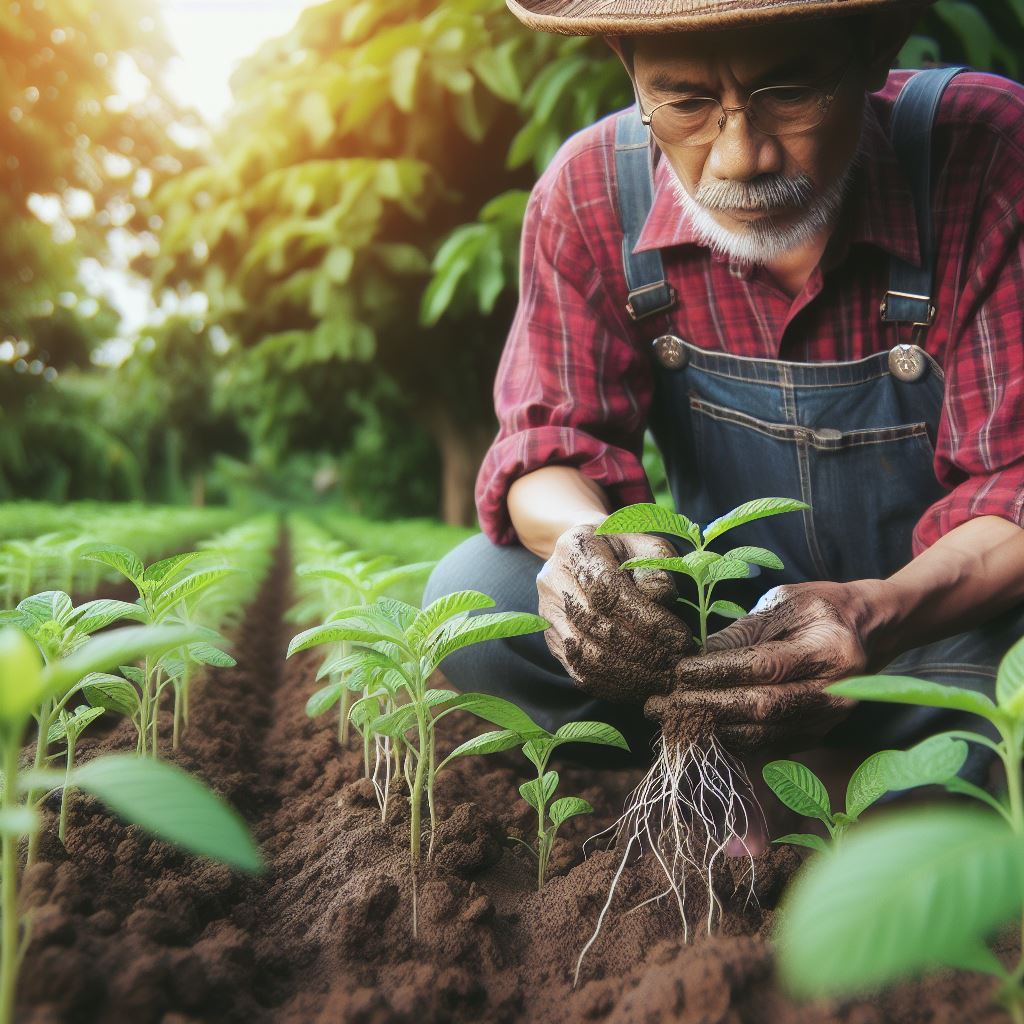Pesticides: Impact on Soil Health
Last Updated on February 25, 2024
Introduction
Pesticides, chemicals used to control pests, have significant effects on soil health. Understanding these impacts is crucial for sustainable agriculture and environmental conservation.
Also, Pesticides are chemical substances used to control pests, including insects, weeds, and fungi, in agriculture. While they can boost crop yields, their extensive use raises concerns about soil health.
Pesticides can harm soil organisms vital for nutrient cycling and soil structure, reducing fertility and biodiversity. Residual pesticides can persist in soil, contaminating water sources and affecting non-target organisms.
Moreover, over-reliance on pesticides can lead to the development of resistant pest populations, necessitating even stronger chemicals.
Sustainable agricultural practices, such as integrated pest management and organic farming, aim to mitigate these impacts while maintaining soil health and ecosystem balance.
Understanding the impact of pesticides on soil health is crucial for several reasons. Firstly, soil health is fundamental for agriculture, as it directly influences crop productivity and quality.
Pesticides, while targeting pests, can also harm beneficial soil organisms like earthworms and microorganisms vital for soil fertility and structure.
Their overuse can lead to soil degradation, erosion, and loss of biodiversity, threatening long-term agricultural sustainability.
Moreover, pesticide residues may contaminate groundwater, posing risks to human health and the environment.
Therefore, comprehending the implications of pesticide usage helps in implementing sustainable agricultural practices that preserve soil health and safeguard ecosystems.
Read: Rice Harvesting Secrets: Improve Yield
What are pesticides?
Definition of pesticides
Pesticides are chemical substances used to control pests that damage crops or spread diseases.
According to the Environmental Protection Agency (EPA), a pesticide is any substance used to prevent, destroy, repel or mitigate any pest.
Common types of pesticides used in agriculture
Common types of pesticides used in agriculture include herbicides, insecticides, fungicides, and rodenticides. Herbicides are used to kill or control weeds that compete with crops for nutrients, sunlight, and water.
Insecticides target and kill insects that harm crops by feeding on them or transmitting diseases.
Fungicides are used to control fungal diseases that can damage crops and reduce yields.
Rodenticides are used to control rodent pests such as mice and rats that can damage crops and spread diseases.
Pesticides are typically applied using different methods, including spraying, dusting, and seed treatment.
Spraying pesticides involves the use of sprayers that disperse a fine mist or spray over the crops. Dusting pesticides involves the application of powdered or granulated pesticides onto the crops or soil surface.
Seed treatment involves coating the seeds with pesticides before planting, ensuring protection from pests as the plants grow.
While pesticides can be effective in controlling pests and increasing crop yields, they can also have negative effects on soil health.
One of the main impacts of pesticides on soil health is their ability to reduce biodiversity.Pesticides can harm beneficial soil organisms such as earthworms, microorganisms, and beneficial insects, disrupting the natural balance.
Without these organisms, the soil ecosystem is compromised, and its ability to support plant growth and nutrient cycling is impaired. Pesticides can also contaminate the soil, water sources, and nearby ecosystems.
How pesticides are applied
When pesticides are applied, a portion can be absorbed by the soil, where they can persist and accumulate over time.
This contamination can lead to the loss of beneficial soil bacteria, fungi, and other microorganisms essential for soil health.
Furthermore, pesticides can leach into groundwater or runoff into nearby rivers and lakes, polluting these water sources.
This pollution can harm aquatic organisms and impact the overall health of aquatic ecosystems.
Another impact of pesticides on soil health is the development of pesticide-resistant pests.As pests are exposed to pesticides over time, they can develop resistance, requiring higher doses or more potent pesticides for control.
This cycle of increasing pesticide use can further harm beneficial soil organisms and disrupt the natural balance of the soil ecosystem.
To mitigate the negative impacts of pesticides on soil health, sustainable farming practices can be adopted.
Crop rotation, for example, can help reduce pest pressure and the need for excessive pesticide use. Using biological controls, such as beneficial insects or bacteria, can provide natural pest management solutions.
Implementing Integrated Pest Management (IPM) strategies can help minimize pesticide use by integrating various pest control methods.
In essence, pesticides play a crucial role in modern agriculture by controlling pests and increasing crop yields.
However, their use can have detrimental effects on soil health, including reduced biodiversity, contamination, and the development of pesticide-resistant pests.
Adopting sustainable farming practices and alternative pest control methods is essential to minimize these negative impacts and ensure long-term soil health.
Read: Apple Picking: Timing for Perfect Fruit
Impact of pesticides on soil health
Pesticides have become a common tool in modern agriculture, significantly increasing crop yields and protecting against pests. However, their use comes with consequences, especially when it comes to soil health.
Loss of biodiversity
Loss of biodiversity is one of the major impacts of pesticides on soil health. Pesticides can harm beneficial organisms in the soil, such as earthworms, bees, and beneficial bacteria.
These organisms play a vital role in maintaining soil fertility and structure. When they are harmed, the overall biodiversity of the soil decreases, leading to an imbalance in the ecosystem.
For example, earthworms are essential for soil aeration and nutrient cycling. Pesticides can directly affect earthworm populations, leading to a decline in their numbers and thus, reduced soil aeration.
Consequently, this can result in decreased water infiltration and nutrient availability for plants, affecting their growth and productivity.
Soil degradation
Soil degradation is another consequence of pesticide use. Pesticides can lead to soil erosion, as they can reduce the stability of soil aggregates, making it more prone to erosion by wind and water.
Additionally, pesticide residues can negatively impact soil structure, reducing its ability to retain water and nutrients. This can further contribute to soil degradation and loss of soil fertility.
Disruption of nutrient cycles
The disruption of nutrient cycles is yet another impact of pesticides on soil health. Pesticides can affect the availability of nutrients in the soil by interfering with beneficial microbial communities.
These microbes are responsible for breaking down organic matter and releasing nutrients that plants can utilize.
When their populations are harmed, nutrient cycling is disrupted, and plants may suffer from nutrient deficiencies, affecting their overall growth and productivity.
Contamination of groundwater
Furthermore, pesticide contamination can extend beyond the soil and reach groundwater sources. Pesticides can leach into the groundwater through infiltration, especially in areas with insufficient soil cover or heavy rainfall.
This poses a significant risk to both human health and the environment. Contaminated groundwater can be used for drinking water supply, leading to potential health issues.
Moreover, it can also impact aquatic ecosystems as these chemicals are carried into rivers, lakes, and other bodies of water, disrupting their delicate balance.
In fact, the use of pesticides in agriculture has undeniable benefits in terms of crop protection and increased yield. However, the impact on soil health cannot be overlooked.
Pesticides can lead to loss of biodiversity, soil degradation, disruption of nutrient cycles, and contamination of groundwater.
It is crucial to implement sustainable farming practices that minimize the use of pesticides and prioritize the long-term health and sustainability of our soils.
Read: Pest Control: Protecting Crops Pre-Harvest

Ways to mitigate the impact of pesticides on soil health
Integrated Pest Management (IPM)
Integrated Pest Management (IPM) is an approach that focuses on long-term pest management strategies.
IPM involves using a combination of techniques such as biological control, crop rotation, and habitat manipulation.
These practices help maintain pest populations at levels below which they cause significant economic damage.
By implementing IPM, farmers can reduce their reliance on synthetic pesticides and minimize their impact on soil health.
Organic farming practices
Organic farming practices offer several advantages in reducing pesticide use and protecting soil health.
Ecological farmers rely on methods such as crop rotation, composting, and biological pest control.
These practices enhance soil health by promoting the growth of beneficial microorganisms and improving soil structure.
By avoiding the use of synthetic pesticides, organic farming minimizes the negative impact on soil biodiversity and ecosystem functioning.
Crop rotation and diversification
Crop rotation is a practice that involves growing different crops in sequential seasons on the same land.
This technique breaks pest cycles, reducing the buildup of pest populations and the need for pesticides.
Furthermore, diversifying cropping systems by planting a variety of crops helps create a more resilient agroecosystem.
By incorporating cover crops, companion planting, and intercropping, farmers can improve soil health and reduce pesticide use.
Soil conservation practices
Soil conservation practices play a crucial role in preventing erosion and soil degradation caused by pesticides.
Implementing techniques like contour plowing, terracing, and strip cropping helps retain soil structure and reduce erosion.
Cover crops and mulching are also effective in maintaining soil moisture and preventing nutrient runoff.
By preserving soil health, farmers can minimize chemical leaching and the long-term negative effects of pesticide use.
Examples of soil conservation practices
Agricultural practices such as conservation tillage, no-till farming, and windbreaks help protect soil from erosion.
Conservation tillage involves leaving crop residues on the soil surface to reduce erosion and nutrient loss.
No-till farming eliminates plowing altogether to preserve soil structure, organic matter, and microbial activity.
Planting windbreaks, such as rows of trees or shrubs, reduces wind erosion and creates a microclimate that supports soil health.
In general, mitigating the impact of pesticides on soil health requires proactive measures and sustainable farming practices.
By implementing Integrated Pest Management (IPM), organic farming practices, crop rotation, and soil conservation techniques, farmers can reduce pesticide use and protect soil health.
These practices not only benefit the environment but also contribute to sustainable agricultural systems that support long-term productivity and food security.
Read: Harvesting Berries: Timing and Techniques
Conclusion
This blog post discussed the impact of pesticides on soil health and highlighted several key points. It is important to consider the effects of pesticides on soil health for sustainable agriculture and environmental protection.
We learned that pesticides can have significant negative effects on soil health, including the depletion of beneficial microorganisms and the disruption of nutrient cycles.
These effects can reduce soil fertility and overall productivity in the long run.
Additionally, pesticide residues can persist in the soil for extended periods, leading to potential contamination of groundwater and surface water sources. This poses a threat to not only the environment but also human health.
By understanding the impact of pesticides on soil health, farmers and policymakers can make informed decisions to minimize their use and adopt sustainable alternatives.
This includes implementing integrated pest management practices, utilizing organic farming techniques, and promoting crop rotation and cover cropping.
Considering the importance of soil health for sustainable agriculture, it is crucial to prioritize the long-term well-being of our soils over short-term gains from pesticide use.
By doing so, we can protect our environment, preserve biodiversity, ensure food security, and safeguard human health.
Therefore, it is essential for ongoing research and education to continue raising awareness about the impact of pesticides on soil health, encouraging the adoption of sustainable agricultural practices that consider the long-term health and productivity of our soils.


